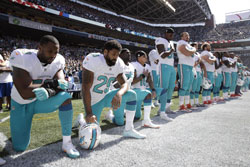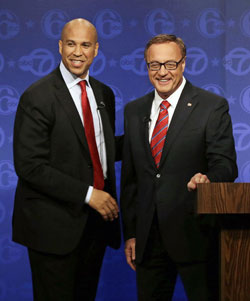President Barack Obama defeated Republican nominee Mitt Romney to earn a second term as President of the United States by an Electoral College count of 332 to 206 on November 6.
Obama won 26 states and the D.C district while Romney won 24 states. Obama won major swing states such as Ohio, Colorado and Florida. Obama also won the popular vote by approximately three million votes.
Susan Pagano, political science major and first time voter, felt this was an exciting race. “It was the first time that I was able to vote, and I am glad that it was in such a thrilling election. I, personally, was ecstatic with the outcome because I think President Obama has the superior plans for the direction of our nation,” said Pagano.
Nicole Bizzoco, political science professor, was surprised about aspects of this race. “I think the campaign leading up to was unprecedentedly expensive, negative and plagued by small-issue debates on both sides. That being said, I did feel there were real differences between the candidates on a number of issues, social issues such as women’s rights and marriage equality in particular. I was surprised by the president’s margin of victory; I was expecting a much closer race.”
The age group of 18 to 24 accounted for 19 percent of the electorate. This has forced both parties to now deal with issues important to this age group.
Pagano believes this helped Obama win the election. “I think both candidates tried to appeal to college and youth voters by making education an important issue up for debate. College loans and financial aid are a huge deciding factor for many college students.
Many students may not be able to get a college education without the various types of financial aid. I also think that the candidates made use of social networking sites, like Facebook and Twitter, to reach out to young voters.”
Dr. Michael Phillips-Anderson, associate communication professor, explained how the youth came out in larger numbers this time around (19 percent of the electorate compared to 8 percent in 2008). “The GOP did little to attract the youth vote,” said Phillips-Anderson.
Dr. Don Swanson, professor of applied communication, said social media helped grab the youth vote as well. “Obviously the Obama campaign used social media wisely. The issues on support for higher education, research, and education for future jobs, were clearly in the Obama campaign rhetoric, and the Romney campaign rhetoric stated a generality in that regard, but the VP candidates’ budget plans would have cut support for higher education, research, and education for future jobs.,” said Swanson.
Women were also a contributing factor. Republicans Todd Aiken and Richard Mourdock had made statements in regards to women’s rights and abortion that may have swayed some women votes away from the Republicans.
Katelyn Nogueira, senior communication major, said “What turned me off the most about his opponent, Mitt Romney, was Romney’s support of a party that seems so against women’s rights and the progress we’ve made in the nation up to this point. The Republicans saw a number of ridiculous comments about rape, pregnancy, and abortion coming from some their candidates.”
Nogueira continued by saying, “The fact that Romney never pulled his support from Mourdock, a man who claimed that pregnancy from rape is ‘intended by God’ was odd and unsettling to me. I certainly did not want to see people like Mourdock and Akin winning senate seats, but those men and their comments turned me off to the whole party, believe it or not. Women’s rights and my ability to control what happens to my body is a really important issue that definitely guided some of my attention and voting in this election.”
Lawren Rohling, social work major, felt the problem for Republicans was deeper. “I felt relieved that Romney didn’t win because I felt I couldn’t trust him. He seemed to not have definite positions on some major issues.”
Jessica Deigert, junior communication major, believed the outcome of the election was predictable. “I thought that the race was tight and the end result was what everybody predicted that I spoke to. For me, I like candidates who care about all types of people and can be seen putting in efforts to help people all over. I personally don’t want a candidate who will say anything just for a vote,” said Deigert.
For other students, this election was more about personal experiences. Tess Oriana La Fera, junior social work major, said, “When the Waldo Canyon Fire struck my home town of Colorado Springs, Colorado this summer, Obama flew out to visit the victims and see the damage, not for purposes of the campaign but to offer his condolences and assistance. Then when the Aurora shooting happened in July, Obama visited again to offer the town his empathy and let the community know that they were in his thoughts. Meanwhile, Romney never bothered to visit any of the victims of these two tragedies except to campaign, and while I may be biased because of the personal connection I have to them, I believe a person that has the heart to really reach out to his nation is more equipped to run it as well.”
Junior political science major, Adrian Palaia is under the impression this shows where America has been and where it is going for the future. Palaia said, “In many ways this election was more momentous than the first because we the people choose to re affirm a plan of a new American. We voted for the right man for job, if it was 1982 and the principles of smaller government and higher defense spending were still needed no doubt America would have voted appropriately; but it’s not so we choose a candidate for 2012. That’s the beauty of democracy.”
During his victory speech, Obama said this victory did not belong to him but to the American people. “Tonight, in this election, you, the American people, reminded us that while our road has been hard, while our journey has been long, we have picked ourselves up, we have fought our way back, and we know in our hearts that for the United States of America the best is yet to come.”
Despite Obama, a Democrat being elected President, the House of Representatives has a Republican majority and the Senate has a Democratic majority. This combination brings forward the issue of the gridlock in Washington due to different political ideology.
Romney addressed the gridlock during his concession speech. “The nation, as you know, is at a critical point. At a time like this we can’t risk partisan bickering and political posturing. Our leaders have to reach across the aisle to do the people’s work, and we citizens also have to rise to occasion.”
Swanson believes this is part of the problem. Swanson said, “Unfortunately too many extreme ideologue candidates seem to believe the ad hominen attacks, labeling, and simplistic unrealistic statements they repeated over and over. Too many Americans are critical thinkers for mindless rhetoric to win simply because it is constantly repeated in excessive advertising.”
Nogueria believes this may be a good thing. “Not only was I happy seeing Obama reelected for another term, I was actually also really excited to see that the Republicans kept control of the House and the Democrats kept control of the Senate. i think that creates a nice balance of power and a better chance of actual bipartisanship in our country,” said Nogueria.
Pagano is pessimistic about this combination. “This really will not help President Obama any more than the previous Congress; however, I think that President Obama may be more willing to compromise now with both sides because he does not have to worry about reelection.
Swanson believes any agreements will not be easily won. He said, “If it does reduce gridlock it will be because the President is a lame duck and the Republicans will not operate from the goal of stopping his re-election. If some realistic GOP officials finally agree to negotiate, as is the method of democracy, important policies can be worked out. Historically the minority has to cooperate with the majority.”
Phillips-Anderson said that the gridlock seems it will continue. “I fear that we will be right back where we started. It is fine to talk about compromise, but it only works if both sides can recognize something that is good in the other’s position. Also meeting in the middle doesn’t mean the 50 yard line if one side is starting off in a more extreme position.”
Bizzoco is optimistic about the possible change in Washington. “I am hopeful that the election will help ease the gridlock based on the fact that no one party won a mandate. The message I hope Washington as whole takes from this election is that the voting public wants the parties to work together and to compromise in order to actually get substantive policy passed and implemented,” said Bizzoco.
Obama also mentioned in his victory speech that, despite different political views, it is more important to be an American first. “That’s why elections matter… Democracy in a nation of 300 million can be noisy and messy and complicated. We have our own opinions. Each of us has deeply held beliefs. And when we go through tough times, when we make big decisions as a country, it necessarily stirs passions, stirs up controversy. That won’t change after tonight, and it shouldn’t..”
Obama continued by saying, “America, I believe we can build on the progress we’ve made and continue to fight for new jobs and new opportunity and new security for the middle class. I believe we can keep the promise of our founders, the idea that if you’re willing to work hard, it doesn’t matter who you are or where you come from or what you look like or where you love. It doesn’t matter whether you’re black or white or Hispanic or Asian or Native American or young or old or rich or poor, able, disabled, gay or straight, you can make it here in America if you’re willing to try.”


